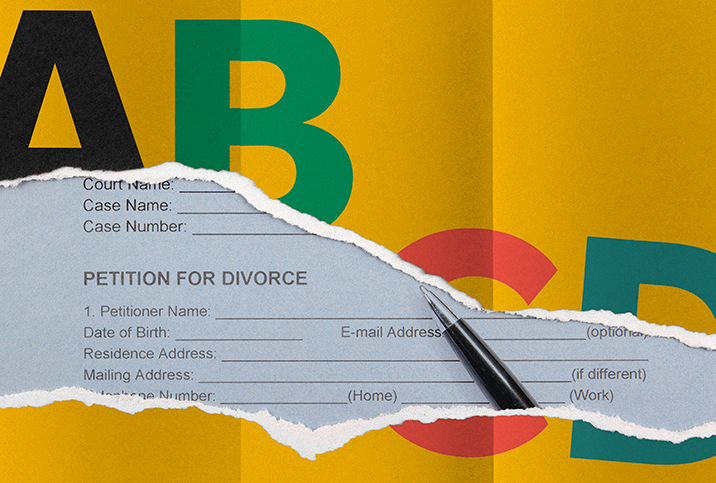The ABCs of Divorce

There's a lot of advice out there for how to have a happy marriage. There's also plenty pertaining to reaching an amicable divorce. However, the concepts of happiness and success rarely seem mutually inclusive within the broader context of divorce.
Yes, divorce is a flawed institution, but with marriage being one of the few ways of legally joining lives, divorce is often the only way out, other than annulment or separation.
Because every divorce case is different, a numbered list isn't going to do you much good. Rather, the best option is to revisit the fundamentals: your ABCs.
'A' is for accountability
"I had a case where the guy was claiming to be unemployed but he was a DJ and his Facebook was full of images of him showing up at a party in a limousine and showing off all of his stuff on Facebook," said Negar Katirai, a professor of law and the director of the Domestic Violence Law Clinic at the University of Arizona James E. Rogers College of Law in Tucson. "So we brought that all in and it was interesting because after we showed our hand in court, then all of a sudden his Facebook was much cleaner."
It can be tempting to try and downplay your earnings or assets accrued during the marriage for fear they will be taken from you but that's typically not actually what happens. Getting busted for being dishonest is likely to make you look worse in all other aspects.
On the flip side, take credit for your contributions. The labor you contributed to the household, whether you have kids or not, plays into key calculations when it comes to divorce assets and property. Anything you contributed to the overall quality of life should be taken into consideration when it comes to division.
Even though accountability takes on a whole new meaning with the internet and record-keeping technology embedded into every aspect of life, it's sometimes surprising how inaccessible the data around us can be. Derek Bambauer, who also teaches at the James E. Rogers College of Law at the University of Arizona, said location-monitoring data from transponders and other tech—while relatively easy to obtain for law enforcement—may not be within reach in civil court cases.
Getting busted for being dishonest is likely to make you look worse in all other aspects. On the flip side, take credit for your contributions.
Data content like location and contact history typically belongs to the companies who manufacture or retail the technology used to collect the information. They don't mind cooperating with police and courts, but big tech companies are not likely to get involved in your divorce if you're looking to prove your spouse was at Motel 6 on a particular Tuesday night. It's important to note divorce courts aren't actually very concerned with matters of fidelity, either.
"In some instances, you actually just can't get that data in any sort of civil suit," Bambauer said. "In some instances, the companies will just resist something like a subpoena. And it's usually too much trouble for private parties to go through to force the company's hand.
"There are all these treasure troves of data," he added, "and it's governed by a mixture of law, business incentives and what we might just think of as social norms, in terms of who has access to the data and when."
'B' is for balance
Divorce is often a topsy-turvy endeavor even in the best cases. It's vital you maintain some degree of objective perspective and try to keep your balance during the process.
For instance, when it comes to aspects of childcare and other family matters, emotions can become heated at any point. Whether you've just been slapped with a request for a divorce, separated for some time or are not even married yet, it's important to keep a cool head. When it comes to domestic life, change is inevitable; these things will someday need to be deconstructed and rearranged in some way or another.
Because divorce proceedings can be sticky and because intimate relationships are often like tinder houses built around raging fires, this particular change may trigger unusual or dramatic emotional states. A breakup is never easy and divorce can often be worse.
This can be especially true if there is an absence of finality to the romantic aspects of the relationship. The marriage may be on track to end, but for some reason, the attraction and, sometimes, the sense of dependency, can linger.
For Billy Mickelson, an Oregon-based musician and performance artist who's lived most of his adult life out of his car, on the road and touring multiple continents, legal and domestic logistics were the least of his concerns from his divorce about three years ago.
"She bought me out of the house and I washed my hands of it financially," he said. "But, it was the emotional side that was hard. Because she stuck to me. We tried to be together after we were divorced, even. It was a very surreal experience."
Balance means reining in your emotions but being sure to validate them, especially when things like abuse or negligence are involved.
This kind of thing happens more often than you might think. There's no canvas big enough to paint a picture of the entire emotional spectrum revealed through separation and divorce. People can be at their best or at their worst when going to court against one another, or in any separation, but the more time a couple spends in court the more likely they are to experience the entire emotional range, some of which is entirely unique to that situation.
Balance means reining in your emotions but being sure to validate them, especially when things like abuse or negligence are involved. It doesn't do the relationship, or the individuals involved, any good to suppress misery within marriage for the sake of presumed convenience. It won't do much good to set off explosions in every argument, either. You've got to find a middle ground.
This can be especially crucial where children are concerned.
Custody and visitation, like many aspects of divorce, are matters best negotiated between parents/former spouses. Of course, issues like substance abuse or hostility in the household may precipitate outside involvement, but when parents can determine a suitable childcare plan among themselves, it tends to be best for all parties involved.
This is doubly important to keep in mind because courts tend to look down on unnecessarily involving the children in conversations about the divorce proceedings.
"Judges only get so much time with you," Katirai said. "They see you for a couple of pre-hearings and then the actual trial and they are just going to make up their mind based on what they see in that setting. And they are very reliant on any kind of expert that comes to the court. Like if they assign a custody evaluator or a court-appointed attorney for the children, they are going to rely on those people more than what you tell them."
In many ways, achieving balance during divorce proceedings is about simply maintaining respect for the other side of the relationship, as well as the other individuals and institutions involved. If you are respectful of your former partner, your kids, the court and the authorities who make those procedures possible, you will likely bypass many of the groan-inducing aspects of divorce by dealing respectfully with your partner, directly.
"I cannot stress enough that if it's a reasonably balanced situation between the two parties, just try and negotiate," Katirai said.
'C' is for compromise
Negotiation is all about compromise, a skill you'll turn into a commodity during a divorce. The ability to compromise isn't something that can be taken from you in litigation, it's simply a concept that helps get everybody what they actually want.
Property can get complicated when personal feelings are involved, too, but the law doesn't always have sympathy for that fact. This is part of the reason why the more you can retain that human element in your divorce negotiations, the better it is for everyone. Of course, communication breakdowns are often part of the reasons a marriage ends, and that's why the court is there.
"Most courts actually require you to go through some kind of mediation before you go to a trial," Katirai said, highlighting one of the key tools courts utilize to minimize the burden of divorce upon the legal system.
These services can be especially helpful for the sentimentally complex but pragmatically essential issues like childcare and family involvement in childrearing.
"Usually the [court-appointed] mediation is mostly for that stuff, like the kids and figuring out parenting times," she said. "And then, I think, there are private mediators that are worth it to see if you can work with them. There's also this new area of law called collaborative divorce."
Collaborative divorce involves a non-competitive approach. Basically, both parties put their cards on the table and transparently go about seeking the best resolution for everyone. The caveat to collaborative divorce is that attorneys sign an agreement saying they cannot participate in future divorce proceedings involving the collaborators should the efforts not pan out. The collaborative approach affords both sides of legal representation too much insight to represent the client fairly in traditional trial settings.
'D' is for divorce
Once you've made it through the first three letters of the alphabet, congratulations, you have achieved divorce. You might be miserable, you might feel a sense of freedom, you may even want to throw a party.
Following the advice laid out here in any specificity to your case would probably require the assistance of a lawyer or at least plenty of time to investigate the parameters of your marriage and the legal system of your state by yourself. But with these ABCs of ending a marriage, you might eventually be able to say you survived the gauntlet.
Just remember, when all is said and done, if you haven't already employed the assistance of a counselor, therapist or at least a good bartender, you'll want to get on top of finding those services, and soon.


















